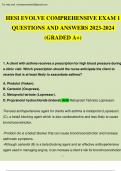Exam (elaborations)
HESI EVOLVE COMPREHENSIVE EXAM 1 QUESTIONS AND ANSWERS (GRADED A+)
HESI EVOLVE COMPREHENSIVE EXAM 1 QUESTIONS AND ANSWERS (GRADED A+) 1. A client with asthma receives a prescription for high blood pressure during a clinic visit. Which prescription should the nurse anticipate the client to receive that is at least likely to exacerbate asthma? A. Pindolol (...
[Show more]



